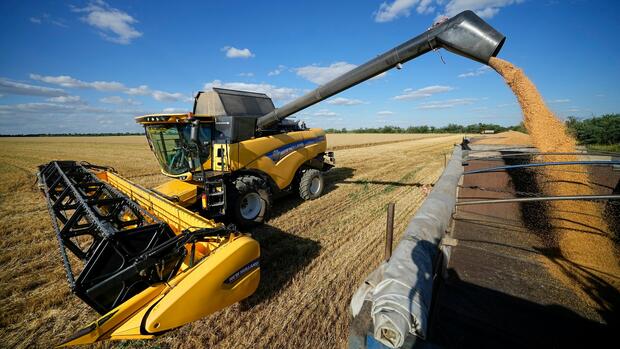Vienna Eastern EU countries have been complaining for months about the consequences that cheap Ukrainian grain is having on their farmers. Now some countries have acted on their own. This means that close allies of Ukraine are putting the country attacked by Russia under strong pressure.
At the beginning of the week, the governments of Poland, Hungary and Slovakia decided to stop letting agricultural goods into the country from Ukraine. The three states want to stop imports from Ukraine by June 30, and Poland no longer wants to allow transit.
Eastern European farmers have been complaining since late summer 2022 that imports from Ukraine are disrupting the domestic markets. Now the situation has worsened. Poland’s farmers argue that imports from Ukraine have pushed down prices.
The farmers are also under pressure in other ways. One problem is the sharp rise in interest rates. Poland’s government has therefore decided on various aid measures. This is also done out of calculation. Elections will be held in Poland next autumn. The ruling party PiS (“Law and Justice”) is based in rural regions.
The EU Commission described the blockade of the three Eastern European countries as “unacceptable”. Nevertheless, Romania’s governing party, the social-democratic PSD, announced on Tuesday that it would propose an import ban to its coalition partners.
The Ukrainian government reacted with outrage. It is understandable that Polish farmers are in a difficult situation, said Minister of Agriculture Mykola Solskyi. “But the situation is most difficult for the Ukrainian farmers.”
>> Read here: “Ukraine war is a warning that nothing is certain” – Western financiers are facing a financial hole
Among other things, the minister is addressing the costly export of Ukrainian agricultural goods. Before Russia launched a full-scale attack on the neighboring country on February 24, 2022, Ukraine exported agricultural products almost exclusively through the Black Sea ports. This route was then interrupted for months, partly because sea mines endangered shipping traffic.
Since August 1, 2022, however, exports have been possible again under the UN Grain Agreement. In February this year, according to the Ukrainian central bank, around 60 percent of grain exports passed through the so-called Black Sea grain corridor; The producers export the rest by truck and rail via Eastern Europe – and there the diversion of the flow of goods has now led to turbulence.
>> Read here: This is how investors protect their portfolio from war and crises
The situation in Eastern Europe has worsened because all import duties on Ukrainian imports into the EU have been suspended since June 2022. This simplification originally applied for one year, but the EU Commission recently announced that it would extend the regulation until 2024. The EU introduced this measure to prop up economically reeling Ukraine.
The export of agricultural goods is vital for Ukraine. Firstly, the products bring in much-needed foreign exchange for the country to buy goods abroad. Second, farmers need the money to buy machinery, fertilizer and seeds.
Ukraine is big in agribusiness
Agribusiness is a Ukrainian domain. Exports rose constantly, while exports of metals, for example, fell and total exports showed large fluctuations. In recent years, agricultural products have accounted for more than 40 percent of goods exports, and in 2022 their share rose to 57 percent.
Agriculture is likely to remain a bone of contention in the long term. In June last year, Ukraine received the status of a candidate for EU membership. It is a rather symbolic gesture, as all parties realize that admitting such a vast country is a complex process and likely to meet with widespread opposition. But conflicts become apparent sooner than expected.
Agriculture is likely to remain a bone of contention
The two sides, Ukraine and the EU states, do not yet understand each other on agricultural issues, says a Ukrainian agricultural manager. While farms in the West are often family businesses, in Ukraine there are large agribusinesses such as MHP, Kernel and IMC. They cultivate areas of 100,000 hectares and more.
These companies have a productivity advantage over the farmers of Western Europe. If Ukraine one day actually joins the EU, it would be a crucial test for the confederation’s agricultural policy.
Some of the EU agricultural subsidies consist of direct payments based on area. A lot of money would therefore flow to Ukraine. The EU would either have to further increase its already huge agricultural budget or cut funding for the “old” member states.
Such a conflict has already existed once: in 2004, when various Eastern European countries joined the EU. The new member Poland in particular was concerned about its own agriculture at the time. At the urging of the Polish government, the EU increased funding for rural development at the time.
Hungary threatens long blockade
Even now there is haggling over agriculture again. Hungary’s government has threatened to block Ukrainian agricultural imports beyond June 30 unless the EU takes action to protect the country’s farmers.
Meanwhile, the Russian government is spreading uncertainty. A spokesman said on Monday the outlook for the grain deal was not favorable.
This was extended in mid-March, but only by 60 days.
This is a problem for Ukrainian agriculture, because long-term purchase agreements for grain cannot be concluded under these conditions. Ukraine suspected Russia of delaying the inspection of grain ships agreed with the UN. Russia has been pushing for relief for its own agricultural sector for some time.
More: Why the Russia sanctions are missing the mark
